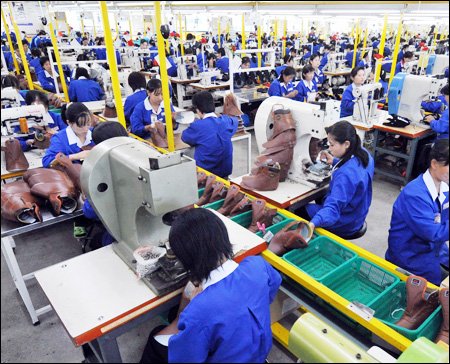Choco Pies fuel productivity at Gaeseong
Published on | Source
Choco Pie is increasingly being distributed by South Korean firms to North Korean workers at the joint Gaeseong Industrial Complex as an incentive for productivity. / Korea Times file
Advertisement
By Kim Young-jin
Choco Pies and other foods are increasingly being distributed as incentives for North Koreans at the joint Gaeseong Industrial Complex, South Korean businesses said Monday, in a sign that workers are increasingly savvy to capitalist ways.
The chocolate-covered biscuits have been used as incentives in the zone for years. But a report by the Corporate Association of Kaesong Industrial Complex, a group of businesses working in the zone, said distribution of the pies had become an increasingly important part of the work culture in the past two years.
A result of the landmark inter-Korean summit in 2000 between the late President Kim Dae-jung and North Korean leader Kim Jong-il, tens of thousands of North Koreans work at about 120 South Korean firms at the complex.
Because the distribution of pay is tightly monitored by the North, the businesspeople have searched for ways to increase productivity through incentives. Items such as Choco Pies are thought to be sold in the North's bourgeoning markets for a tidy profit. Instant noodles and eggs are also passed out by the firms.
"At first I tried to get the workers to work overtime and they said no. But then I offered them Choco Pies and they were eager", the report quoted an unnamed businessmen as saying. "Choco Pies definitely play a major role".
The treats are said to be widely popular in the North and are seen among a number of South Korean cultural items growing in popularity there. DVDs featuring South Korean television dramas and pop music are also sold after being brought in through the porous border with China.
The report said better facilities, such as the installment of shower stalls and improvements to cafeterias, were also well-received by the North Korean workers.
The minimum monthly wage for workers at the complex stands at around $67 but it is suspected that a large portion of that goes back to the regime.
The widely accepted distribution of the pies and their resale in the market reflect the North's changing attitude toward capitalist concepts.
The markets were born out of necessity during a 1990s famine that killed hundreds of thousands. After attempts to squelch the system including a disastrous currency revaluation in 2009, the regime has allowed state-sanctioned markets and turned a blind eye to informal ones scattered around the country.
New leader Kim Jong-un has stressed economic development since taking over last December.
The regime recently passed down instructions to implement the so-called "June 28 new economic management system", a policy that ditches its rationing system and offers new incentives for workers. It reportedly involves factory enterprises setting their own prices for goods, rather than the state, giving them more leeway to decide on matters such as production and distribution of profits.
